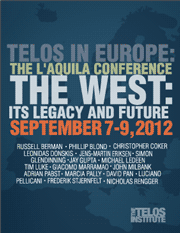This is the second of three papers delivered at a seminar on religion and politics that was organized with Rowan Williams, the former archbishop of Canterbury, on the occasion of his recent book Faith in the Public Square. The seminar was held at Radboud University in December 2013. The first paper, by Martijn de Koning, appears here. The third paper, by Herman Westerink, will be posted here shortly.
According to the publisher of Faith in the Public Square, “Archbishop Rowan Williams is the most gifted Anglican priest of his generation. His views are consistent and orthodox and yet he has been consistently misunderstood.” Now maybe this is just another case of misunderstanding, but I doubt, not whether Rowan Williams is the most gifted priest of his generation, but whether his views are really that orthodox. In my understanding of that term—though I should stress that my vocabulary is not first and foremost theological—Faith in the Public Square is far from an orthodox book. It is unafraid to challenge received opinions, both religious and other kinds. This for instance shows itself in Williams’s consistent challenging of a dichotomy that has long shaped Western social and political thought, namely that of Gemeinschaft versus Gesellschaft, or of community versus society. What I am referring to is the idea that there is a sharp distinction between, on the one hand, traditional social bonds based on a robust shared identity resulting in organic solidarity—that would be Gemeinschaft—and on the other hand typically modern organizations of collective life in the form of negotiated interests and impersonal contracts—which would be Gesellschaft (and I’ll stick to the German terms because these bring out the contrast most clearly).
 Should national identity be considered to be an outdated concept in this day and age? Have the adjectives “French,” “Italian,” “German,” and so on become meaningless terms over the last couple of decades? Both practical and theoretical developments may seem to suggest that this question should be answered in the affirmative. Processes of globalization, including increased mobility and migration, have made it unmistakably clear that the human world cannot be divided into discrete social units. In addition, much philosophical effort has been devoted to destabilizing notions like “community,” “sameness,” and “identity.”
Should national identity be considered to be an outdated concept in this day and age? Have the adjectives “French,” “Italian,” “German,” and so on become meaningless terms over the last couple of decades? Both practical and theoretical developments may seem to suggest that this question should be answered in the affirmative. Processes of globalization, including increased mobility and migration, have made it unmistakably clear that the human world cannot be divided into discrete social units. In addition, much philosophical effort has been devoted to destabilizing notions like “community,” “sameness,” and “identity.” 

